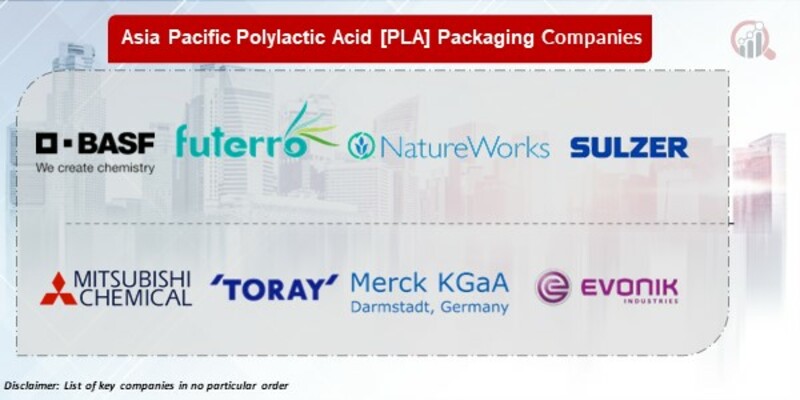Top Industry Leaders in the Asia Pacific Polylactic Acid PLA Packaging Market

The Asia Pacific region, a bustling hub of consumerism and innovation, is also witnessing a surge in green consciousness. This resonates within the packaging industry, where Polylactic Acid (PLA), a biodegradable and bio-based alternative to traditional plastics, is rapidly gaining traction. Let's delve into the competitive landscape of this burgeoning market, exploring the strategies, factors influencing market share, industry news, and recent developments shaping its future.
Strategies Weaving a Sustainable Future:
-
Product Diversification: Leading players like NatureWorks and Mitsubishi Chemical Corporation are expanding their PLA offerings beyond rigid packaging, developing flexible films, pouches, and even heat-resistant options for food and beverage applications. This caters to diverse needs and unlocks new market segments. -
Technological Innovation: Companies like Zhejiang Hisun Biomaterials and PTT Global Chemical are investing in research and development, improving PLA's properties like heat resistance, barrier performance, and processing efficiency. This addresses concerns about its limitations and opens up wider adoption possibilities. -
Strategic Partnerships and Collaborations: To overcome challenges like limited production capacity and infrastructure, players are forging partnerships with established packaging manufacturers, distributors, and waste management companies. This creates a robust ecosystem for PLA adoption. -
Sustainable Practices and Certifications: Demonstrating eco-conscious production processes, using recycled content, and obtaining certifications like "compostable" or "biodegradable" builds trust and attracts environmentally conscious consumers and brands. -
Cost-Effectiveness and Value Proposition: While upfront costs might be higher, companies are highlighting the long-term benefits of PLA, such as reduced waste disposal costs, improved brand image, and potential regulatory compliance advantages.
Factors Shaping Market Share:
-
Government Regulations and Incentives: Stringent regulations on plastic waste in countries like China and India are driving the demand for sustainable alternatives like PLA. Additionally, subsidies and tax breaks for bio-based packaging further incentivize adoption. -
Consumer Preferences and Environmental Awareness: Growing awareness of plastic pollution and the desire for eco-friendly products are influencing consumer choices. This creates a fertile market for PLA packaging solutions. -
E-Commerce and Online Food Delivery: The booming e-commerce and online food delivery sectors require innovative and sustainable packaging solutions. PLA's lightweight and compostable properties make it a perfect fit for these applications. -
Regional Growth Dynamics: Asia Pacific is the largest and fastest-growing market for PLA packaging, driven by factors like rapid urbanization, increasing disposable income, and rising environmental concerns. China, Japan, and India are key players in this region. -
Infrastructure Development and Recycling: Expanding infrastructure for PLA production, composting facilities, and efficient recycling systems will be crucial for the long-term sustainability and cost-effectiveness of PLA packaging.
Key Players:
- BASF SE
- Futerro
- NatureWorks LLC
- TotalEnergies Corbion
- Sulzer Ltd
- Mitsubishi Chemical Corporation
- TORAY INDUSTRIES, INC.
- Merck KGaA
- Musashino Chemical Laboratory, Ltd.
- Evonik Industries AG
- Polyvel Inc.
- UNITIKA LTD.
- Jiangxi Academy of Sciences Biological New Materials Co., Ltd.
- Shanghai Tong-jie-liang Biomaterials Co., Ltd.
- Zhejiang Hisun Biomaterials Co., Ltd.
- Radici Partecipazioni SpA
Recent Developments:
January 2024: A new research consortium in Japan develops a cost-effective catalyst for bio-based PLA production, potentially disrupting traditional production methods and reducing costs.
February 2024: The Indian government announces new regulations banning single-use plastic in several cities, further boosting the demand for PLA packaging alternatives.
March 2024: A leading Chinese PLA manufacturer partners with a European waste management company to establish a closed-loop recycling system for PLA packaging, addressing concerns about its end-of-life management.
April 2024: A new biodegradable and heat-resistant PLA film is developed, opening up possibilities for PLA packaging in hot-fill applications like soups and sauces.
June 2024: A consortium of industry stakeholders establishes a global PLA packaging standards and certification body, aiming to ensure consistency and quality in the market.


![Asia Pacific Polylactic Acid [PLA] Packaging Market Research Report—Forecast till 2035 Infographic](https://www.marketresearchfuture.com/uploads/reports/12683/asia-pacific-polylactic-acid-pla-packaging-market_infograph.webp)








